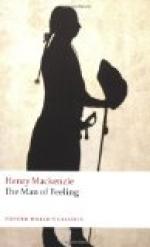The elder of the strangers complained of the closeness of the evening, and asked the other if he would go with him into a house hard by, and take one draught of excellent cyder. “The man who keeps this house,” said he to Harley, “was once a servant of mine. I could not think of turning loose upon the world a faithful old fellow, for no other reason but that his age had incapacitated him; so I gave him an annuity of ten pounds, with the help of which he has set up this little place here, and his daughter goes and sells milk in the city, while her father manages his tap-room, as he calls it, at home. I can’t well ask a gentleman of your appearance to accompany me to so paltry a place.” “Sir,” replied Harley, interrupting him, “I would much rather enter it than the most celebrated tavern in town. To give to the necessitous may sometimes be a weakness in the man; to encourage industry is a duty in the citizen.” They entered the house accordingly.
On a table at the corner of the room lay a pack of cards, loosely thrown together. The old gentleman reproved the man of the house for encouraging so idle an amusement. Harley attempted to defend him from the necessity of accommodating himself to the humour of his guests, and taking up the cards, began to shuffle them backwards and forwards in his hand. “Nay, I don’t think cards so unpardonable an amusement as some do,” replied the other; “and now and then, about this time of the evening, when my eyes begin to fail me for my book, I divert myself with a game at piquet, without finding my morals a bit relaxed by it. Do you play piquet, sir?” (to Harley.) Harley answered in the affirmative; upon which the other proposed playing a pool at a shilling the game, doubling the stakes; adding, that he never played higher with anybody.
Harley’s good nature could not refuse the benevolent old man; and the younger stranger, though he at first pleaded prior engagements, yet being earnestly solicited by his friend, at last yielded to solicitation.
When they began to play, the old gentleman, somewhat to the surprise of Harley, produced ten shillings to serve for markers of his score. “He had no change for the beggar,” said Harley to himself; “but I can easily account for it; it is curious to observe the affection that inanimate things will create in us by a long acquaintance. If I may judge from my own feelings, the old man would not part with one of these counters for ten times its intrinsic value; it even got the better of his benevolence! I, myself, have a pair of old brass sleeve buttons.” Here he was interrupted by being told that the old gentleman had beat the younger, and that it was his turn to take up the conqueror. “Your game has been short,” said Harley. “I re-piqued him,” answered the old man, with joy sparkling in his countenance. Harley wished to be re-piqued too, but he was disappointed; for he had the same good fortune against his opponent. Indeed, never




